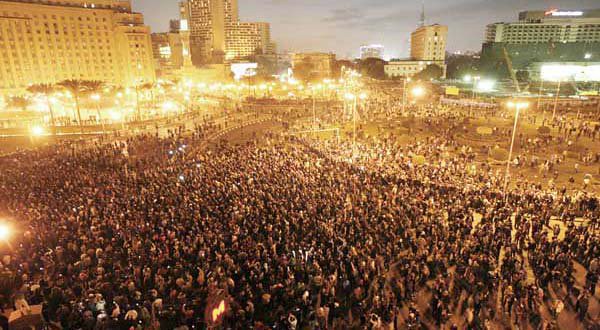
Demonstration Against Mubarak Government in Cairo (Jan. 25, 2011)
2/1/2011 Note from Dave Belden: we are delighted to see this piece by Rabbi Lerner is prominent on the Al Jazeera English website today (permanent link here).
Ever since the victory over the dictator of Tunisia and the subsequent uprising in Egypt, my email has been flooded with messages from Jews around the world hoping and praying for the victory of the Egyptian people over their cruel Mubarak regime.
Though a small segment of Jews have responded to right-wing voices from Israel that lament the change and fear that a democratic government would bring to power fundamentalist extremists who wish to destroy Israel and who would abrogate the hard-earned treaty that has kept the peace between Egypt and Israel for the last 30 years, the majority of Jews are more excited and hopeful than worried.
Of course, the worriers have a point. Israel has allied itself with repressive regimes in Egypt and used that alliance to ensure that the borders with Gaza would remain closed while Israel attempted to economically deprive the Hamas regime there by denying needed food supplies and equipment to rebuild after Israel’s devastating attack in December 2008 and January 2009. If the Egyptian people take over, they are far more likely to side with Hamas than with the Israeli blockade of Gaza.
Yet it is impossible for Jews to forget our heritage as victims of another Egyptian tyrant – the Pharoah whose reliance on brute force was overthrown when the Israelite slaves managed to escape from Egypt some 3,000 years ago. That story of freedom, retold each year at our Passover “Seder” celebration and read in synagogues in the past month, has often predisposed the majority of Jews to side with those struggling for freedom around the world. To watch hundreds of thousands of Egyptians able to throw off the chains of oppression and the legacy of a totalitarian regime that consistently jailed, tortured or murdered its opponents so overtly that most people were cowed into silence, is to remember that the spark of God continues to flourish no matter how long oppressive regimes manage to keep themselves in power, and that ultimately the yearning for freedom and democracy cannot be totally stamped out no matter how cruel and sophisticated the elites of wealth, power and military might appear to be.
Many Jews have warned Israel that it is a mistake to ally with these kinds of regimes, just as we’ve warned the US to learn the lesson from its failed alliance with the Shah of Iran. We’ve urged Israel to free the Palestinian people by ending the Occupation of the West Bank and the blockade of Gaza. Israel’s long-term security will not be secured through military or economic domination, but only by acting in a generous and caring way toward the Palestinian people first, and then toward all ofits Arab neighbors. Similarly, America’s homeland security will best be achieved through a strategy of generosity and caring, manifested through a new Global Marshall Plan such as has been introduced into the House of Representatives by Congressman Keith Ellison.
In normal times, when the forces of repression seem to be winning, this kind of thinking is dismissed as “utopian” by the “realists” who shape public political discourse. But when events like the uprisings in Tunisia and Egypt occur, for a moment the politicians and media are stunned enough to allow a different kind of thinking to emerge, the kind of thinking that acknowledges that underneath all the “business as usual” behavior of the world’s peoples, the yearning for a world based on solidarity, caring for each other, freedom, self-determination, justice, non-violence and yes, even love and generosity, remains a potent and unquenchable thirst that may be temporarily repressed but never fully extinguished.
It is this recognition that leads many Jews to join with the rest of the world’s peoples in celebrating the uprising, in praying that it does not become manipulated by the old regime into paths that too quickly divert the hopes for a brand new kind of order into politics and economics as usual, or into extremist attempts to switch the anger from domestic elites who have been the source of Egyptian oppression onto Jews or Israel which have not been responsible for the suffering of the Egyptian people.
We hope that Egyptians will hear the news that they have strong support from many in the Jewish world.
